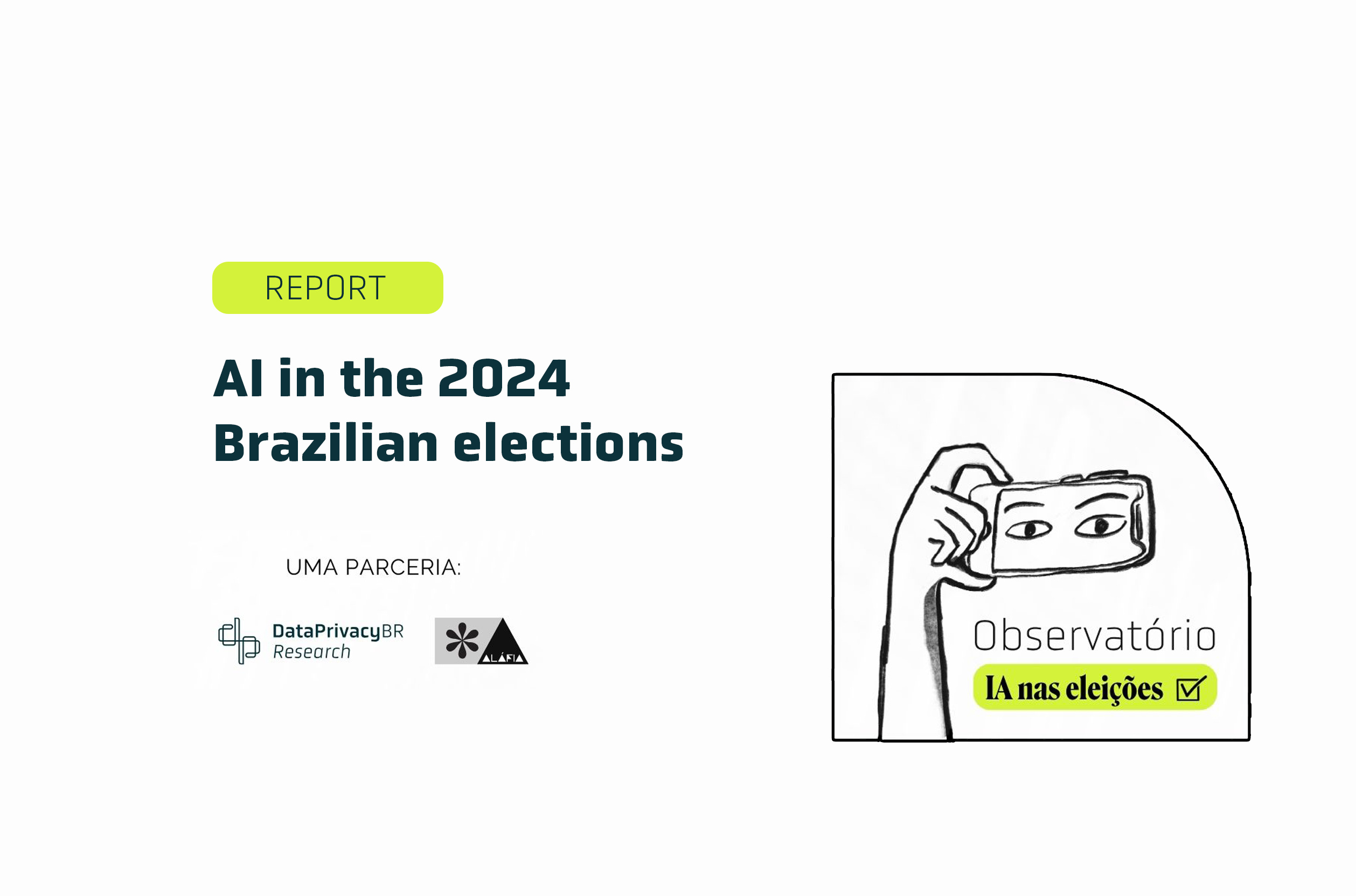AI in the 2024 Brazilian elections
Aláfia Lab, *desinformante and Data Privacy Brasil launch the report “AI in the 2024 Brazilian elections”, with an analysis of the use of artificial intelligence in the first round of the elections.
Aláfia Lab, *desinformante and Data Privacy Brasil launch the report “AI in the 2024 Brazilian elections”, with an analysis of the use of artificial intelligence in the first round of the elections. The report is the result of the “AI Observatory in the Elections“, promoted by Data Privacy Brasil, through the AI with Rights project, in partnership with Aláfia Lab and *desinformante, which aims to map and record cases of use of generative AI during the 2024 Brazilian elections.
On October 5, 2024, more than five thousand Brazilian municipalities held elections. For the first time, an election in the country was held with the widespread and popularized presence of artificial intelligence. With this new development, the Superior Electoral Court (TSE) created specific rules to delimit the use of tools by candidates and political campaigns.
In the mapping carried out by the Observatory, it was possible to analyze that, despite the efforts of the TSE, candidates continued to use artificial intelligence without notifying the electorate. Over the past few weeks, active monitoring and searches have been carried out on digital platforms, media outlets, and fact-checking agencies to collect and document the cases identified.
However, data collected between August 16 and October 6 showed that the impression that there would be a massive use of AI in campaigns was not confirmed. Specific uses were identified and, in most cases, without major repercussions. The document also points out that the use of AI occurs both by candidates and campaigns and – sometimes even more intensely – by voters and in different media formats (image, video, and audio). Therefore, regulatory measures or public policies on the subject need to take into account different audiences and uses of the technology.
The analysis also identified that, among the main uses of AI, are: the broad application of the technology to produce jingles or to assist in the production of campaign content with little funding; the creation of deepfakes produced by the public with relatively little impact but which show the potential for misinformation in the upcoming elections; and cases of deepnudes targeting candidates in different municipalities.
In addition, the report also contains reports on the impact of AI on disinformation and the position of the Justice Department in the cases that were found. The document is already available for reading, and the Observatory will continue mapping cases in this second round. Visit the website and learn more about this work. Access the link and check out the new report.
Veja também
-
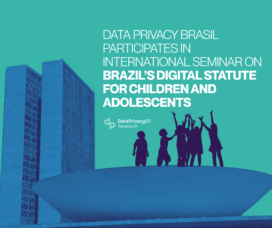
Data Privacy Brasil participates in international seminar on Brazil’s Digital Statute for Children and Adolescents
Yesterday, Data Privacy Brasil took part in the seminar “Online Safety for Children Statute: Lessons from the Brazilian Experience”, organized by Digital Action and Conectas Human Rights. Check out our report featuring the key highlights from the event.
-

Brazilian Senate approves Landmark Digital Child Protection Bill: what are the next steps?
On 27 August 2025, Brazil's Senate approved Bill PL 2628/2022, focused on protecting the rights of children in digital platforms. What happens now?
-
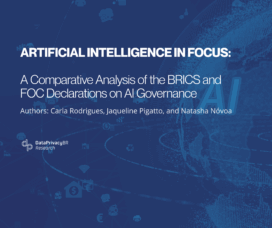
Artificial Intelligence in Focus: A Comparative Analysis of the BRICS and FOC Declarations on AI Governance
The BRICS Leaders' Declaration on Global Governance of Artificial Intelligence has gained prominence in both Brazilian and international media, as it represents a joint position by Global South countries in the ongoing contest over this emerging technology.
-

AI Explainability: How to Avoid Rubber-Stamping Recommendations
Experts debate if human oversight can replace the need for the explainability of AI systems. Bruno Bioni, co-director of Data Privacy Brasil, was one of the experts interviewed. Check it out in the text!
-

Digital Merger Watch: Data Privacy Brasil joins new global initiative
The group includes national and international organizations and will focus on analyzing and challenging Big Tech’s efforts to reinforce its dominance through mergers and acquisitions.
-

Beyond Digital Rights: Towards a Fair Information Ecosystem?
One of the major challenges in the field of digital rights is the tendency toward segmentation and hyper-specialization in topics such as privacy, freedom of expression, net neutrality, data protection, and the regulation of AI systems. Learn more about the topic in the article published in Tech Policy.
-
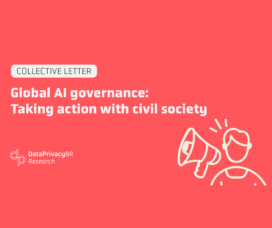
Global AI governance: Taking action with civil society
More than 40 civil society organizations call for inclusion in AI Action Summit in letter on global governance of Artificial Intelligence.
-
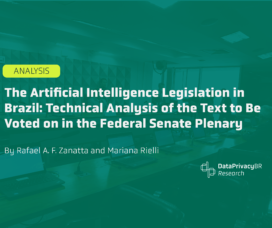
The Artificial Intelligence Legislation in Brazil: Technical Analysis of the Text to Be Voted on in the Federal Senate Plenary
The Internal Temporary Artificial Intelligence Committee (CTIA) of the Federal Senate approved the substitute report for Bill 2338/2023. This bill aims to define the legal framework for regulating the use of Artificial Intelligence systems in Brazil.
Veja Também
-

Data Privacy Brasil participates in international seminar on Brazil’s Digital Statute for Children and Adolescents
Yesterday, Data Privacy Brasil took part in the seminar “Online Safety for Children Statute: Lessons from the Brazilian Experience”, organized by Digital Action and Conectas Human Rights. Check out our report featuring the key highlights from the event.
-

Artificial Intelligence in Focus: A Comparative Analysis of the BRICS and FOC Declarations on AI Governance
The BRICS Leaders' Declaration on Global Governance of Artificial Intelligence has gained prominence in both Brazilian and international media, as it represents a joint position by Global South countries in the ongoing contest over this emerging technology.
-

AI Explainability: How to Avoid Rubber-Stamping Recommendations
Experts debate if human oversight can replace the need for the explainability of AI systems. Bruno Bioni, co-director of Data Privacy Brasil, was one of the experts interviewed. Check it out in the text!
-

Digital Merger Watch: Data Privacy Brasil joins new global initiative
The group includes national and international organizations and will focus on analyzing and challenging Big Tech’s efforts to reinforce its dominance through mergers and acquisitions.
-

Beyond Digital Rights: Towards a Fair Information Ecosystem?
One of the major challenges in the field of digital rights is the tendency toward segmentation and hyper-specialization in topics such as privacy, freedom of expression, net neutrality, data protection, and the regulation of AI systems. Learn more about the topic in the article published in Tech Policy.
-

Global AI governance: Taking action with civil society
More than 40 civil society organizations call for inclusion in AI Action Summit in letter on global governance of Artificial Intelligence.
-

The Artificial Intelligence Legislation in Brazil: Technical Analysis of the Text to Be Voted on in the Federal Senate Plenary
The Internal Temporary Artificial Intelligence Committee (CTIA) of the Federal Senate approved the substitute report for Bill 2338/2023. This bill aims to define the legal framework for regulating the use of Artificial Intelligence systems in Brazil.
-

A Fragmented Landscape Is No Excuse for Global Companies Serious About Responsible AI
For the third year in a row, MIT Sloan Management Review and Boston Consulting Group (BCG) have brought together an international panel of AI experts to help gain insights into the lack of alignment around global standards and norms for responsible AI. Bruno Bioni, co-director of Data Privacy Brasil, was one of the experts interviewed. Check it out in the text!
-

Research Project Outcomes: A vision for inclusive educational technology
Check out Júlia Mendonça's interview for Tech Ethics Lab, about the use of technology in schools.
-
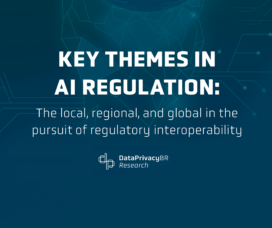
Key Themes in AI Regulation: The local, regional, and global in the pursuit of regulatory interoperability
Data Privacy Brasil releases its report “KeyThemes in AI Regulation: The local, regional, and global in the pursuit of regulatory interoperability,” supported by the Heinrich Böll Foundation. This work is the result of months of research under the project “Where the SabIA Sings: Governance and Regulation of Artificial Intelligence from Brazil”.
-
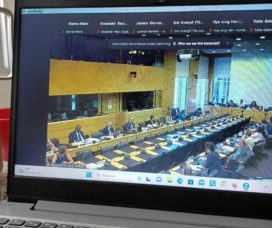
Data Privacy Brasil participates in UN’s OHCHR briefing on Brazil
The organization highlighted how the advance of edtech has been violating children’s privacy in the country
DataPrivacyBr Research | Content under licensing CC BY-SA 4.0

